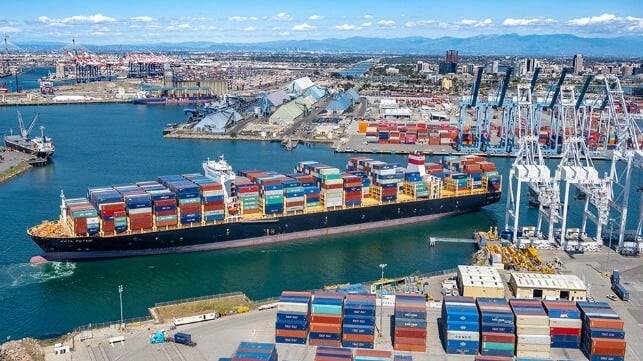FMC Seeks to Define “Unreasonable” Actions by Carriers

The Federal Maritime Commission is opening a public comment period as it seeks to define what constitutes “unreasonable” actions by ocean carriers. The commission is working to define the provisions and process for the enforcement of the elements of the Ocean Shipping Reform Act of 2022. One of the impetuous of the reforms passed by Congress and signed by President Joe Biden were shippers’ complaints that carriers were refusing shipments and unwilling to negotiate to provide space on their vessels.
A provision of legislation requires that “an ocean common carrier shall not unreasonably refuse to deal or negotiate with respect to vessel space accommodation.” Congress required the FMC to define the actions and develop the process for the complaints to be addressed.
The FMC issued a Notice of Proposed Rulemaking today as the next step in the process as it implements the provisions of the reform act. Specifically, it addresses the requirement to define unreasonable refusal to deal or negotiate for space provided by an ocean common carrier and gives the public 30 days to submit comments.
The FMC outlines the elements that would be necessary to establish a violation and the criteria it will use to consider the complaint under the new rule. The legislation included a roadmap for the FMC requiring it to publish rules of the key elements within six months after the bill was signed into law in June by President Biden.
Unreasonable action complaints would be accepted both from importers and exporters. Either would be permitted to complain about an unreasonable refusal to deal or negotiate with a shipper regarding vessel space.
One of the key elements of many of the provisions of the reform act shifts from the shipper to the carrier the burden of proof in responding to complaints. In these specific cases, the shipper would file a complaint regarding the carriers’ actions and the carrier under the proposed rule would have to establish why it was not unreasonable to refuse vessel space to a particular shipper.
While the FMC says it acknowledges that the circumstances of each shipment are unique and that it is impossible to regulate for every possible scenario, the proposed rule provides examples of factors it will consider. The rule proposes that the commission would consider whether the ocean common carrier followed a documented export strategy, engaged in good faith negotiations, and articulated legitimate transportation factors.
The rulemaking process also seeks to clear up elements of the legislation that were not defined. Specifically, the FMC is addressing the phrase “vessel space accommodations” which has never been defined in legislation. The draft rule proposes to define “vessel space accommodations” generally as space provided aboard a vessel of an ocean common carrier for laden containers being imported to, or exported from, the United States.
The FMC continues to make progress on the key elements of the reform act including establishing a new Bureau of Enforcement, Investigations, and Compliance structure. A separate comment period on the use of the emergency powers in the act is closing. The FMC is required under the law to report to Congress on its progress in implementing the provisions of the Ocean Shipping Reform Act.
